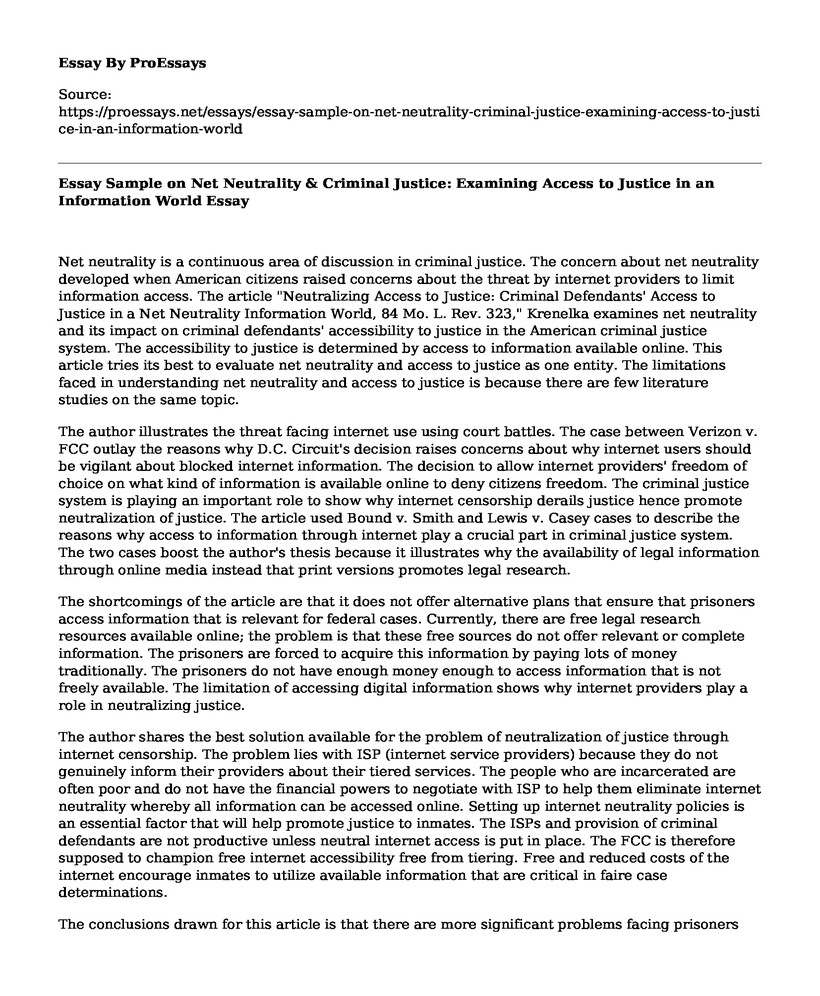Net neutrality is a continuous area of discussion in criminal justice. The concern about net neutrality developed when American citizens raised concerns about the threat by internet providers to limit information access. The article "Neutralizing Access to Justice: Criminal Defendants' Access to Justice in a Net Neutrality Information World, 84 Mo. L. Rev. 323," Krenelka examines net neutrality and its impact on criminal defendants' accessibility to justice in the American criminal justice system. The accessibility to justice is determined by access to information available online. This article tries its best to evaluate net neutrality and access to justice as one entity. The limitations faced in understanding net neutrality and access to justice is because there are few literature studies on the same topic.
The author illustrates the threat facing internet use using court battles. The case between Verizon v. FCC outlay the reasons why D.C. Circuit's decision raises concerns about why internet users should be vigilant about blocked internet information. The decision to allow internet providers' freedom of choice on what kind of information is available online to deny citizens freedom. The criminal justice system is playing an important role to show why internet censorship derails justice hence promote neutralization of justice. The article used Bound v. Smith and Lewis v. Casey cases to describe the reasons why access to information through internet play a crucial part in criminal justice system. The two cases boost the author's thesis because it illustrates why the availability of legal information through online media instead that print versions promotes legal research.
The shortcomings of the article are that it does not offer alternative plans that ensure that prisoners access information that is relevant for federal cases. Currently, there are free legal research resources available online; the problem is that these free sources do not offer relevant or complete information. The prisoners are forced to acquire this information by paying lots of money traditionally. The prisoners do not have enough money enough to access information that is not freely available. The limitation of accessing digital information shows why internet providers play a role in neutralizing justice.
The author shares the best solution available for the problem of neutralization of justice through internet censorship. The problem lies with ISP (internet service providers) because they do not genuinely inform their providers about their tiered services. The people who are incarcerated are often poor and do not have the financial powers to negotiate with ISP to help them eliminate internet neutrality whereby all information can be accessed online. Setting up internet neutrality policies is an essential factor that will help promote justice to inmates. The ISPs and provision of criminal defendants are not productive unless neutral internet access is put in place. The FCC is therefore supposed to champion free internet accessibility free from tiering. Free and reduced costs of the internet encourage inmates to utilize available information that are critical in faire case determinations.
The conclusions drawn for this article is that there are more significant problems facing prisoners apart from internet access. There are problems facing inmates before even the issue of information access. Most inmates are not literate, therefore denying them an opportunity to obtain and make legal sense of the information made available to them through prison libraries. A high number of prisoners do not have computer skills, therefore, denying them a chance to increase internet access. Internet access without knowledge of legal information is useless because courts' decision on cases depends on whether there exists a claim.
Cite this page
Essay Sample on Net Neutrality & Criminal Justice: Examining Access to Justice in an Information World. (2023, Apr 10). Retrieved from https://proessays.net/essays/essay-sample-on-net-neutrality-criminal-justice-examining-access-to-justice-in-an-information-world
If you are the original author of this essay and no longer wish to have it published on the ProEssays website, please click below to request its removal:
- Private Security Personnel Should Have a Stronger Background on Criminal Justice
- Economies of Legalizing Marijuana Essay
- The Role of Society in Crime Prevention Essay
- Charles Manson's Personality Based on Sigmund Freud and Karen Horney's Theories
- Paper Example on Juvenile Justice and Delinquency
- Essay Sample on Crime in New York Between 1850 and 1950
- American Youth Incarceration: Race Disparities in Justice System - Essay Sample







